Learning car maintenance skills is not only empowering but also a practical way to save money on car repairs. I know you love what you just heard.
The automobile industry is a major contributor to global economic growth, employing millions of people worldwide and driving technological advancements in transportation
Whether you’re a DIYer, a car owner, someone who loves working with their hands and loves to pick up new challenges in automobiles looking to handle basic maintenance tasks, or an aspiring auto mechanic, attending car maintenance classes can provide you with the knowledge and skills you need.
In this comprehensive guide, we will explore the top car maintenance classes available near you in the USA.
From basic maintenance to advanced repair techniques, these classes offer a wide range of topics to suit your learning needs.
Let’s dive in and discover the best car maintenance classes near you.
But do not read ahead to discover the best yet; doing so will leave you confused in choice, which seems to be a common problem with humans.
Take your time to read this report straight through so you get the juice.
Contents

Finding the Best Car Maintenance Classes Near Me
When searching for car maintenance classes near you in the USA, there are several factors to consider. Here’s an outline of the key steps to help you find the best car maintenance classes:
Determine Your Learning Goals
Determining your specific automotive maintenance learning goals is an important first step before enrolling in a car maintenance class. This helps ensure you select the course level that best fits your needs.
First, think about your current mechanical skill level. Are you a total beginner looking for an introduction to basic car maintenance? Or do you already have some experience with oil changes and brake pads but want to take your knowledge to the next level?
Also, consider what types of repairs you want to learn. A basic vehicle maintenance class focused on fluids, filters, batteries, and tires may suit your needs if you own an older, paid-off vehicle.
However, if you have a newer car still under warranty, a class on diagnostics and dealing with sensors, belts, and hoses would be more applicable.
So determine if you want a general overview of car systems or deeper training in a specific area like engine performance, electrical systems, or transmissions. Master technicians take years to learn every system thoroughly. Target classes matching your main interests.
Knowing whether you need basic skills, advanced troubleshooting, or specialty system knowledge will point you towards the car maintenance course that best fits your experience level and goals.
That way, you gain maximum practical knowledge and hands-on experience that applies to your specific vehicle needs.
Research Local Training Centers and Schools
Once you’ve determined your automotive maintenance learning goals, start researching training options in your local area, which I hope you find in the list below. Here are some tips for finding quality classes and instructors:
- Check technical schools and community colleges with automotive programs. Hands-on courses with access to shop facilities and tools are ideal. Look for ASE-certified instructors.
- Search for independent auto mechanic schools. Specialized training centers often offer flexible, multilevel courses for home mechanics. Make sure they have positive reviews.
- Don’t overlook adult continuing education programs. Local school districts may offer introductory DIY maintenance classes through community outreach.
- Search online sites like Udemy for online video courses. It is convenient for basic knowledge but lacks hands-on practice.
- Inquire at local repair shops. Some hold weekend basics workshops or provide training for a fee using their professional shop equipment.
- Compare class format: in-person vs. online, one-time workshop vs. multi-week courses, evenings, or weekends for 9–5 workers.
- Check instructor qualifications and teaching ability in addition to facility quality. More knowledgeable teachers provide better value.
Take time to thoroughly research all car maintenance training options in your area. Weigh factors like convenience, teaching expertise, practical learning, and costs to find the provider best aligned with your goals.
Check the course curriculum and Duration
When researching car maintenance courses, take time to carefully review the curriculum and topics covered in each course.
Compare the class syllabus and schedule to the goals you identified earlier. For example:
- If seeking general maintenance knowledge, ensure the curriculum covers core areas like oil and fluid changes, brakes, filters, batteries, belts, hoses, tires, and basic troubleshooting.
- For deeper electrical system training, check that it includes extensive wiring diagrams, circuit testing, sensor and module functions, fuse boxes, etc.
- For engine repair proficiency, look for disassembly and rebuilding, performance tuning, diagnosing leaks and noises, and thorough mechanical instruction.
Also consider class duration and format:
- One-day crash courses provide a brief overview but lack depth. Weeklong or multi-month courses enable better retention.
- Online courses offer convenience but may lack hands-on physical tasks. In-person classes provide real-world experience.
- Programs with integrated shop time and instructor access develop practical skills better than strictly lecture-based formats.
Matching the topics covered to your exact needs ensures you get maximum value from the class time and tuition spent.
Don’t settle for generalized courses if you want specialized knowledge. Invest time researching each program’s curriculum details before enrolling.
Consider Hands-on Experience
When evaluating car maintenance classes, the amount of hands-on experience provided should be a top priority.
Practical, first-hand training is crucial for developing real competency versus just theoretical knowledge.
Look for programs that offer the following types of hands-on learning:
- Shop time is spent working directly on training vehicles to practice tasks demonstrated by instructors. Develops familiarity with tools and builds muscle memory.
- Disassembly and rebuilding of engines, transmissions, and other components. Visualizing internals improves troubleshooting.
- Instructor-supervised time performing repairs and maintenance on customer vehicles. Real-world experience.
- Diagnostic exercises test batteries, charging, electronics, etc. Apply theory from readings and lectures.
- Troubleshooting practices include identifying deliberately installed defects. Sharpens deduction skills.
- Training on shop equipment like lifts, tire machines, brake lathes, and engine hoists builds operation familiarity.
- Socket or wrench exercises are needed to learn proper torquing techniques. Prevent over- or under-tightening.

Evaluate Costs and Financial Aid Options
When selecting a vehicle maintenance class, be sure to carefully consider the costs involved and research any financial assistance available.
- Check the total tuition cost, fees, textbooks, supplies, and certification expenses, if applicable. Get a complete estimate.
- For multi-week courses, inquire if installment plans are allowed to spread out payments over time.
- Ask if discounts are offered for early registration, multi-class sign-ups, group enrollments, etc.
- Research scholarships, grants, or loans provided by training providers, vocational programs, or community organizations.
- Evaluated the potential for employer education assistance for part-time mechanics or auto workers.
- Consider DIY options using repair manuals or online videos for the most budget-friendly foundation.
- Weigh the total cost versus the expected long-term value. Quality training pays dividends for years.
Aim for the most comprehensive program within your budget. Hands-on shop classes tend to be more expensive but are worth the investment. With some diligence, you can find affordable financing and support options.
A small investment now in car maintenance education could save thousands down the road.
Read Reviews and Testimonials
You don’t want some BS, I guess. Before enrolling in an automotive training program, take time to read reviews and feedback from past students.
This provides valuable insight into the program’s quality and effectiveness that marketing materials may not offer.
Specifically, look for reviews that mention:
- Knowledge and experience of the instructors: were they competent industry veterans or just hobbyists? Look for ASE-certified teachers.
- Format and teaching methods: Did the structure logically build skills? Were demonstrations and explanations clear?
- Shop facilities and tools: Were shop resources sufficient to provide quality, hands-on training?
- Overall value gained: Did past students feel the program was worth the tuition paid and time invested?
- Real-world applicability: Were the skills practical and applicable to working on actual vehicles vs. just theory?
- Career impact: For professional programs, did completion help graduates earn jobs, certifications, or advance in the field?
- Areas needing improvement: This identifies possible shortcomings to improve your experience.
Evaluating past students’ perspectives provides a first-hand account of the effectiveness of the training.
Look for common themes stressing practical knowledge gained and long-term benefits versus just general satisfaction.
Quality classes produce graduates with confidence in applying professional-level maintenance skills.
Top 5 Car Maintenance Classes in the USA
Here are some of the top car maintenance classes available in the USA:
- Universal Technical Institute (UTI):
- Locations: Arizona, California, Florida, Illinois, New Jersey, Michigan, North Carolina, Pennsylvania, and Texas.
- Program Duration: Varies depending on the program.
- Special Features: UTI offers specialized training in various automotive brands and technologies, including BMW, Ford, General Motors, Mercedes-Benz, Mopar, Porsche, Toyota, and Volvo. They also provide programs for electric vehicles, diesel engines, collision repair, and more.
- Website: UTI
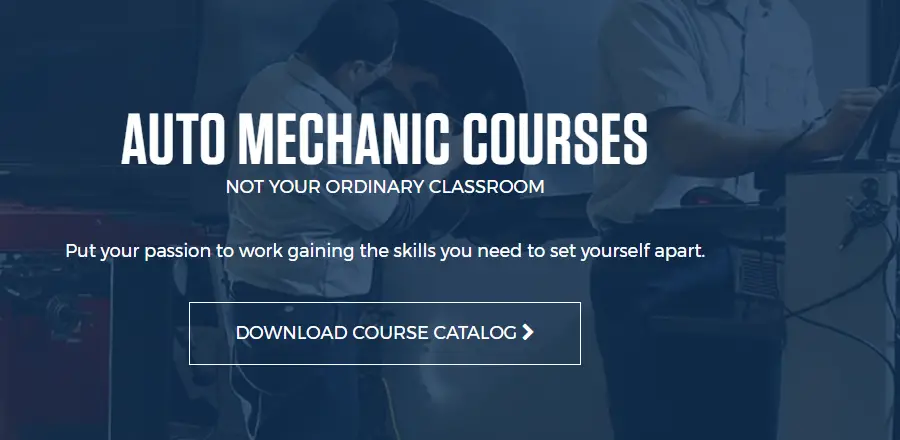
- Auto Mechanic School:
- Location: N/A
- Program Duration: 51 weeks
- Special Features: Auto Mechanic School offers a comprehensive Automotive Technology Program that combines online training with hands-on application. Their program includes core training, manufacturer-specific advanced training courses, and ASE certification training.
- Website: Auto Mechanic School
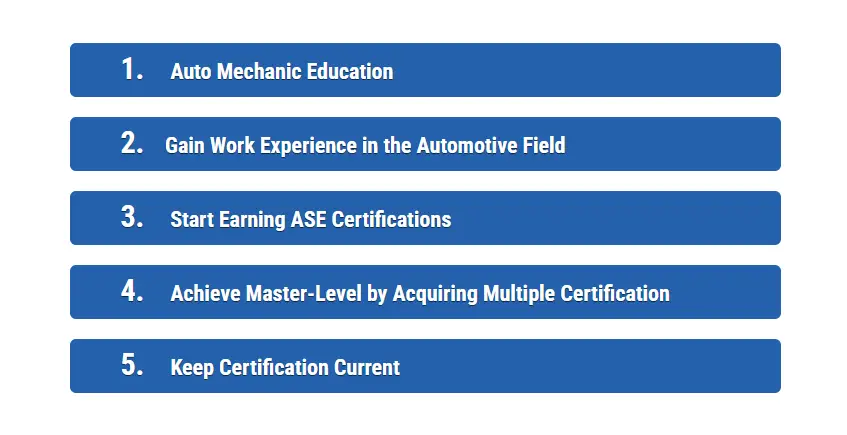
- NASCAR Technical Institute:
- Location: Mooresville, NC
- Program Duration: 48 weeks
- Special Features: The NASCAR Technical Institute provides specialized training in NASCAR-related automotive technology. Their program includes courses such as NASCAR Engines, NASCAR Chassis Applications, and NASCAR Pit Crew. Students have the opportunity to work on engines that have won races in NASCAR-sanctioned events.
- Website: NASCAR Technical Institute
- Pittsburg State University:
- Location: Pittsburg, Kansas
- Program Duration: Bachelor of Science in Automotive Technology
- Special Features: Pittsburg State University offers a comprehensive program that provides students with practical experience in state-of-the-art labs. The program covers topics such as engine dynamics, brake systems, and electronic systems, preparing students for diverse roles in the automotive industry.
- Website: Pittsburg State University
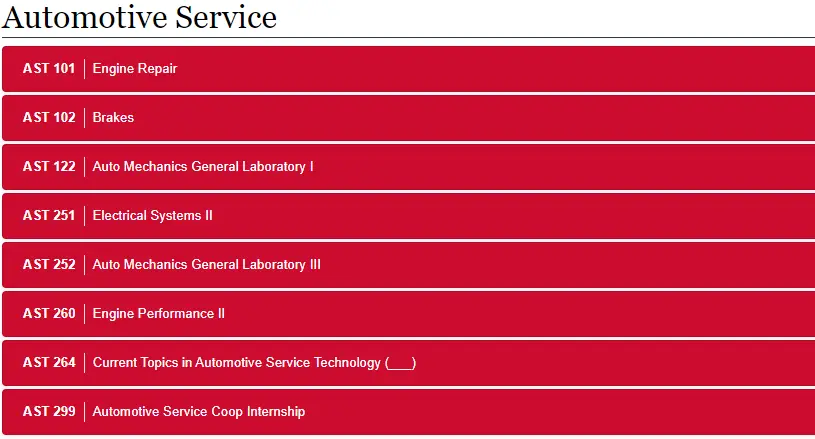
- Rolla Technical Institute:
- Location: Rolla, Missouri
- Program Duration: Two-year Automotive Technology program
- Special Features: Rolla Technical Institute’s program focuses on auto shop safety, tools, and equipment, as well as basic and advanced engine fundamentals. Students gain hands-on experience and enhance their diagnostic and repair skills.
- Website: N/A
The Benefits of Attending Car Maintenance Classes
Attending car maintenance classes near you in the USA offers numerous benefits. Here are some key advantages to enrolling in these classes:
Cost Savings on Car Repairs
By learning car maintenance skills, you can save money on costly repairs. You can do basic maintenance tasks like oil changes, filter replacements, and brake pad replacements yourself, eliminating the need for expensive trips to the mechanic.
Confidence in Handling Maintenance Tasks
Attending car maintenance classes gives you the confidence to handle common maintenance tasks. You’ll gain a deeper understanding of how your car works and feel more comfortable troubleshooting issues and performing routine maintenance.
Personal Empowerment and Independence
Learning car maintenance skills empowers you to take control of your vehicle’s upkeep. You’ll no longer need to rely solely on mechanics for every small issue or regular maintenance task. This independence can save you time and give you a sense of accomplishment.
Potential Career Opportunities
If you’re passionate about cars and enjoy working with your hands, attending car maintenance classes can open up potential career opportunities. By gaining knowledge and hands-on experience, you can pursue a career as an auto mechanic or explore other automotive-related professions.
Networking and Community
Car maintenance classes provide an opportunity to connect with like-minded individuals who share your interest in cars. You can build a network of fellow car enthusiasts, exchange knowledge, and learn from each other’s experiences.

Conclusion
Attending car maintenance classes near you in the USA is an excellent way to gain valuable knowledge and skills in car maintenance. Whether you’re a DIY car owner or an aspiring auto mechanic, these classes can help you save money on car repairs and gain confidence in handling common maintenance tasks.
Remember to determine your learning goals, research local training centers, check the course curriculum, consider hands-on experience, evaluate costs and financial aid options, and read reviews before making a decision. By enrolling in a car maintenance class near you, you can learn from experienced instructors and gain the necessary skills to keep your car in top shape.
Have you made up your mind?
FAQs
Are car maintenance classes only for aspiring auto mechanics?
No, car maintenance classes are beneficial for both aspiring auto mechanics and DIY car owners. They provide valuable knowledge and skills that can help you save money on car repairs and gain confidence in handling maintenance tasks.
Can I learn car maintenance without attending classes?
While it’s possible to learn car maintenance through online resources and self-study, attending car maintenance classes offers the advantage of hands-on experience and guidance from experienced instructors.
How long do car maintenance classes typically last?
The duration of car maintenance classes can vary depending on the course and the institution offering them. Some classes may be as short as a few days or weeks, while others may span several months.
Can I pursue a career as an auto mechanic after attending car maintenance classes?
Attending car maintenance classes can provide a solid foundation for pursuing a career as an auto mechanic. However, additional training and certifications may be required to become a professional auto mechanic.
Are financial aid options available for car maintenance classes?
Some training centers or schools may offer financial aid options, such as scholarships, grants, or payment plans, to help make car maintenance classes more affordable. It’s worth exploring these options when considering enrollment.
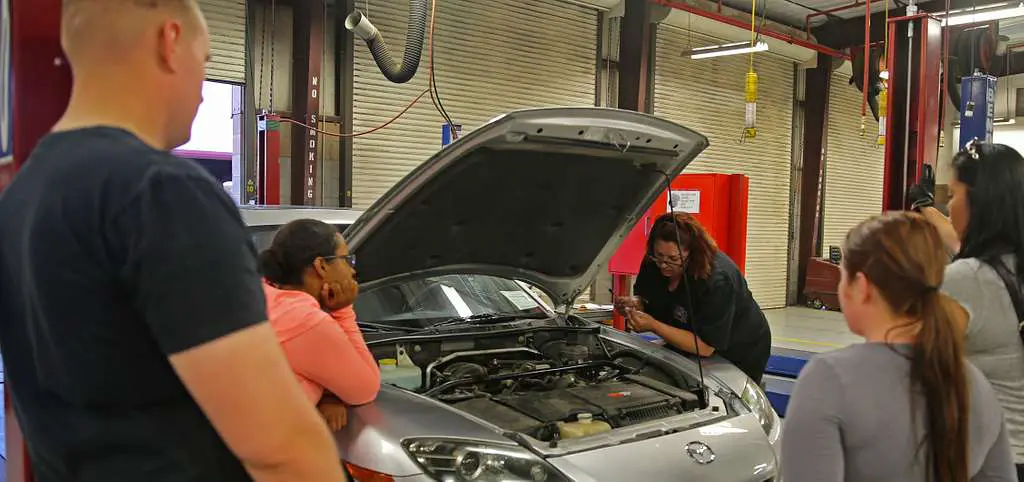


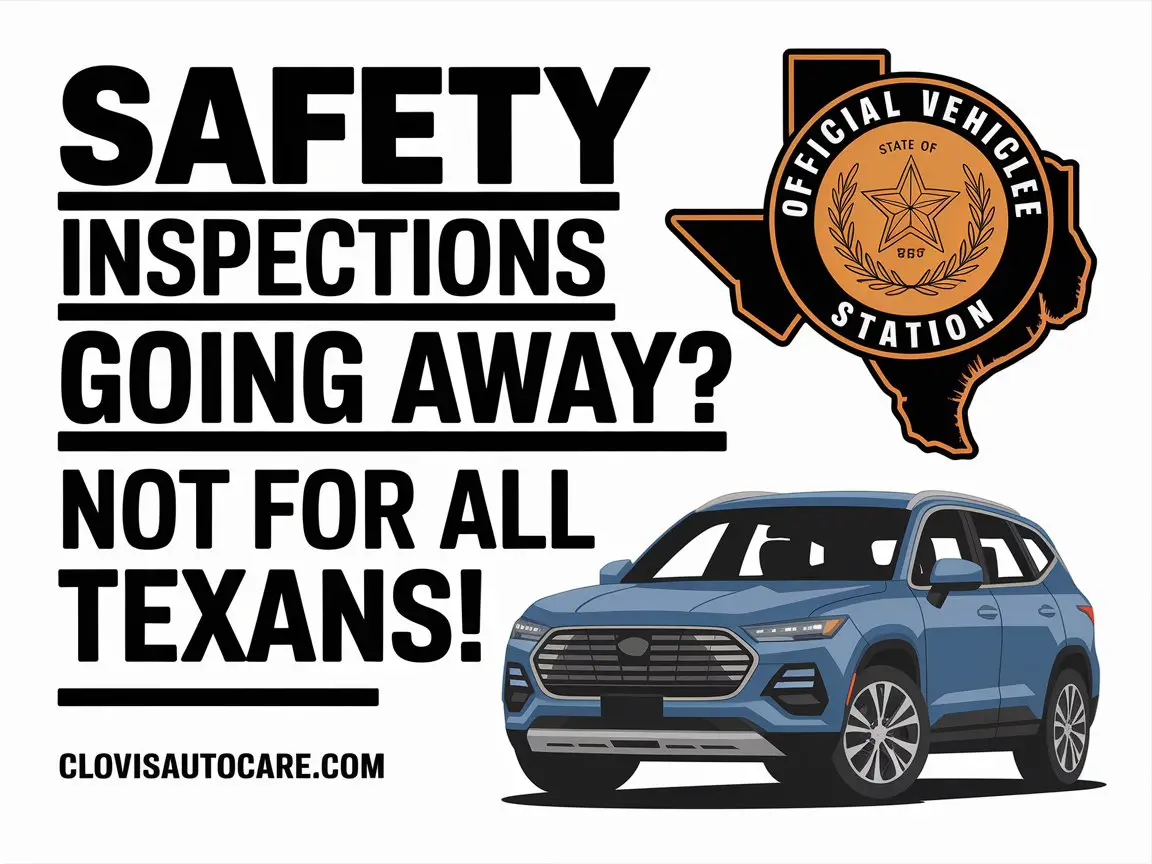
Leave a Reply